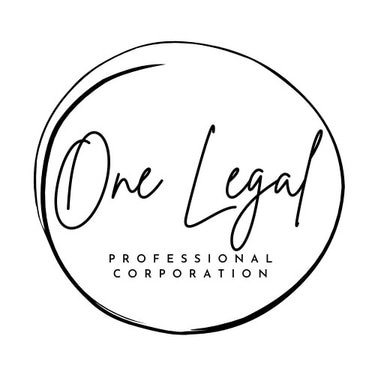Renovating Without Ownership: What You Need to Know About Unjust Enrichment in Ontario Family Law
OneLegal Professional Corporation
6/9/20252 min read


Renovating Without Ownership: What You Need to Know About Unjust Enrichment in Ontario Family Law
By OneLegal Professional Corporation
Picture this: You’ve spent years pouring your time, savings, and sweat into upgrading your spouse’s property—installing hardwood floors, gutting the kitchen, landscaping the backyard. But now, the relationship ends, and you’re left asking: “What about everything I invested?”
At OneLegal Professional Corporation, we hear this question all too often. If you’re not listed on the title but have significantly contributed to your partner’s home, the law may still be on your side. The concept you’re looking for? Unjust enrichment.
What Is Unjust Enrichment in Family Law?
Unjust enrichment is a legal doctrine designed to prevent one party from unfairly benefiting at another’s expense. In family law, it often applies when one spouse contributes to property that legally belongs to the other.
To make a successful claim, you must prove three things:
Enrichment: Your former partner gained a benefit (e.g., increased property value due to your renovations).
Deprivation: You lost something (e.g., money, time, or effort).
No Juristic Reason: There’s no legal justification (such as a contract, gift, or mutual agreement) for the enrichment.
⚖️ Case Law Insight: In Ledrew v. Ledrew, a constructive trust was awarded when a spouse’s unpaid contributions significantly increased the value of their partner’s home.
Does Sweat Equity Count?
Absolutely. Courts in Ontario recognize that domestic services and unpaid labour—such as doing renovations, managing a household, or contributing financially to improvements—can count as valid contributions.
Whether you hired contractors or installed the backsplash yourself, if your work added real value and you weren’t compensated, that’s the kind of deprivation courts take seriously.
How Do Courts Decide on Compensation?
If the court finds that unjust enrichment occurred, it will look to restitution—a legal remedy aimed at restoring the balance.
This can take two forms:
Monetary compensation: A lump sum reflecting your contributions.
Constructive trust: A share of ownership in the property if money alone won’t do justice.
The court will weigh whether your contributions are directly linked to the property and if awarding a portion of the equity is more appropriate than a simple payout.
What If I Didn’t Have a Contract?
Not having a written agreement doesn't disqualify you. In fact, the absence of a formal contract can support your claim that there was no juristic reason for the property owner to retain the benefits you conferred. As long as your contributions weren’t meant as a gift, you may have a strong legal footing.
Takeaway: Don’t Let Your Contributions Go Unrecognized
If your partner owns the house but you helped make it a home—and increased its value in the process—you may be entitled to compensation. Courts in Ontario have shown they’re willing to protect people who aren’t on title but have made significant contributions to a shared life.
OneLegal Is Here to Help
At OneLegal Professional Corporation, we specialize in family law and property disputes. Our team can:
Assess whether you have a valid unjust enrichment claim
Calculate the value of your contributions
Advocate for your rights in negotiations or court
Help you recover your fair share of the property or its value
📞 Book Your Free Consultation Today
If you’ve renovated a property you don’t legally own, don’t wait until it’s too late. Protect your financial interests and secure what’s rightfully yours.
👉 Contact us now to speak with an experienced family lawyer about your situation.
Let's Connect!
Contact US
info@onelegal.ca
Tel: (416) 380-7501
Fax: (416) 642-9457
The Information on this website is for informational purposes, and should not be construed as legal advice. If you require specific legal advice regarding your family law matter, please contact us to schedule a consultation
Copyright © 2025 OneLegal Professional Corporation
